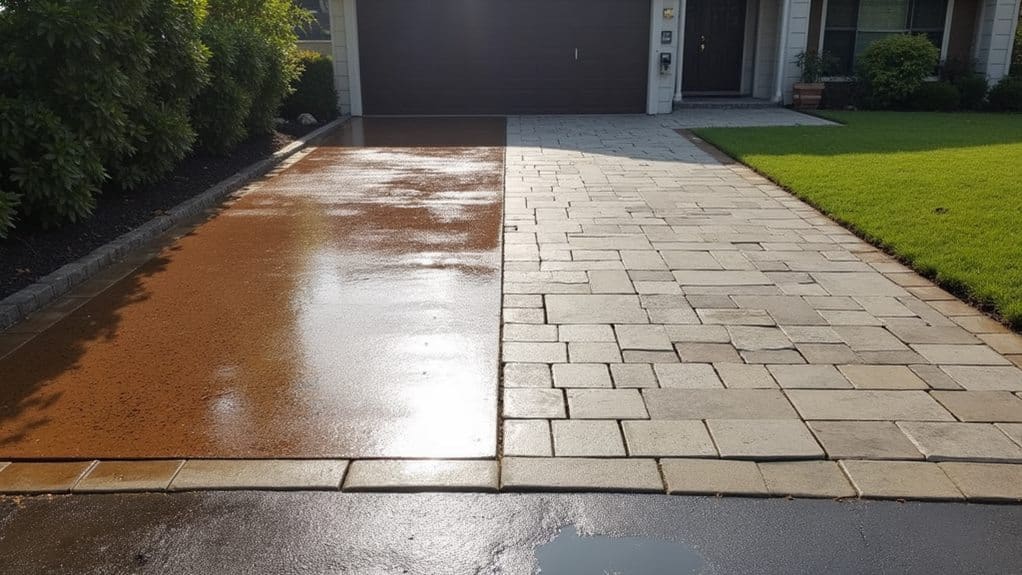Resin driveways outperform traditional block paving, concrete and asphalt in several key areas. Starting at £80 per square metre, they might cost more initially but save money long-term through minimal upkeep and a 20+ year lifespan.
The material handles extreme weight (up to 400 tonnes per square centimetre), resists UV damage and provides excellent drainage that meets current UK regulations.
With 48 gravel blends to choose from, you can match any property style, from period homes to modern builds. Installation takes just one day, compared to a week for conventional materials – meaning less disruption to your daily routine.
As a bonus, a resin driveway can boost your property value by up to 20%, making it a solid investment for British homeowners.
The material’s practical benefits, coupled with its sleek appearance, make it a compelling alternative to traditional driveway surfaces.
Think of it as getting the durability of concrete with the aesthetic appeal of gravel, minus the maintenance headaches of either.
Key Takeaways
Resin vs Traditional Driveways: The Facts
- A resin driveway serves you for over 20 years with little upkeep, whilst tarmac and other standard options need regular maintenance and typically last 15-20 years.
- Starting costs for resin sit at £80 per square metre, whilst block paving ranges from £70-120. Though slightly pricier upfront, resin proves more cost-effective long-term.
- Unlike conventional surfaces that often lead to puddles and flooding, resin driveways are fully permeable – ticking all the boxes for UK sustainable drainage regulations.
- Fancy a quick installation? Resin driveways take just a day to complete, compared to a week’s disruption with traditional block paving.
- Looking to maintain kerb appeal? Resin offers 48 different stone blends that keep their colour, whilst traditional materials tend to look worn and faded within years.
Understanding Resin Driveway Composition
Three core elements make up a resin driveway: natural aggregates, polyurethane resin and a specialised binding process. This combination provides both lasting strength and design flexibility.
Natural aggregates, including marble and gravel, form the driveway’s base. Installation costs vary across the UK based on location and design choices, with proper aggregate mixing being crucial for best results.
These stones are blended with UV-resistant polyurethane resin to create a surface that flexes with British weather conditions whilst maintaining its structure.
The most notable feature of resin driveways is their permeability. The binding technique creates tiny gaps between stones, letting rainwater drain naturally through the surface. This makes resin driveways particularly suited to UK planning requirements for sustainable drainage solutions.
You can personalise your driveway’s look by choosing from various aggregate blends. Whether you prefer warm golden tones or classic grey hues, the UV-stable materials ensure your chosen colour scheme stays fresh-looking throughout the seasons.
Traditional Materials at a Glance
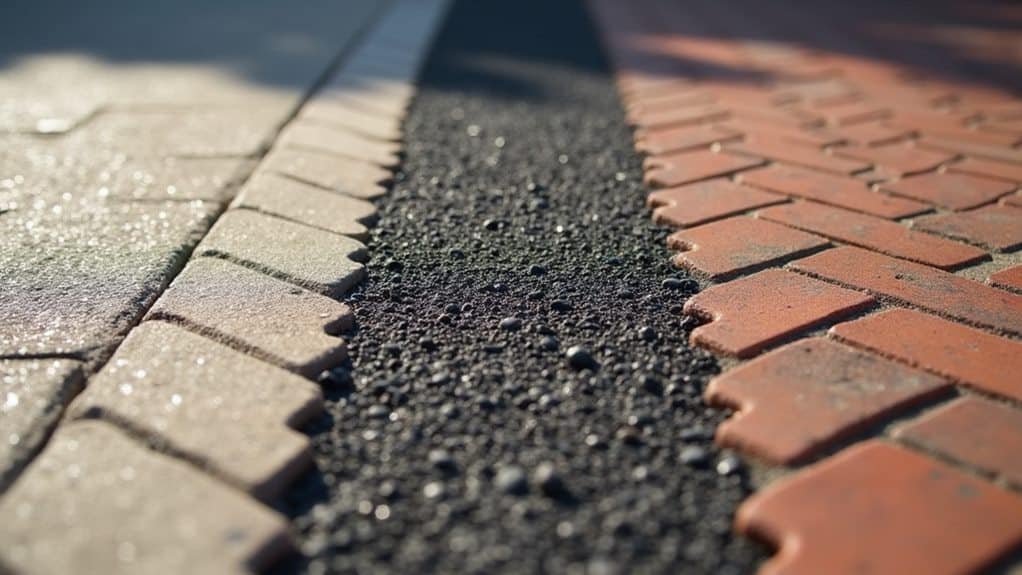
Traditional driveway materials remain popular despite newer resin alternatives. Understanding their key features helps make the right choice for your property.
| Feature | Traditional Materials |
|---|---|
| Lifespan | Concrete: 35+ years, Asphalt: 15-20 years, Block paving: 20-25 years |
| Durability | Concrete: High resistance, Asphalt: Moderate, Block paving: Variable |
| Installation | All require compacted sub-base and proper drainage systems |
| Maintenance | Regular sealing, crack repairs, and cleaning needed |
| Cost | Varies from moderate (asphalt) to high (decorative block paving) |
Each material has distinct benefits. Concrete offers excellent longevity and strength but can crack in harsh weather. Block paving delivers versatile designs and colours, though weeds between blocks need regular attention. Asphalt provides a cost-effective option with quick installation, but tends to suffer more in British weather and needs frequent upkeep. These time-tested materials have proved reliable over decades, though each requires specific maintenance to consider when choosing your driveway surface.
Cost Analysis and Value

Initial costs for resin bound driveways start at £80 per square metre, whilst traditional block paving begins at £70.
However, the long-term savings are substantial – resin driveways require minimal maintenance and rarely need repairs. Their impressive strength supports up to 400 tonnes per square centimetre, far exceeding standard driveway materials.
Most resin driveways come with a 20-year guarantee, saving you from regular resealing costs and pesky weed control typical with traditional surfaces.
Plus, a resin driveway can boost your property value by up to 20%, making it a smart investment when weighing both upfront costs and future benefits.
Initial vs. Lifetime Expenses
Initial costs for resin driveways start at £80 per square metre, whilst traditional block paving ranges from £70-£120. However, the real value lies in long-term expenses.
| Cost Factor | Resin Driveways | Traditional Block Paving |
|---|---|---|
| Initial Cost/m² | £80+ | £70-£120 |
| Maintenance/Year | Minimal | Regular |
| Lifespan | 20+ years | 15-20 years |
| Additional Costs | Rare repairs | Resealing, weed control |
| Property Value Impact | Up to 20% increase | Standard appreciation |
Traditional block paving requires constant upkeep, including yearly resealing and weed treatments. Resin driveways, though pricier at first, need far less maintenance and last longer. Over a 20+ year lifespan, a resin driveway proves more cost-effective, boosting property value whilst keeping ongoing costs low.
Think of it like buying quality boots versus cheap ones – you might spend more initially, but you’ll save money by not having to replace them as often. The same principle applies here; resin driveways are the more economical choice in the long run.
Material Price Comparison
Resin bound systems start at £80/m², offering simpler pricing compared to block paving’s £70-£120/m² range. The consistent pricing of resin bound driveways makes budgeting more straightforward, whilst block paving prices vary with material costs and pattern complexity.
Resin surfaces boast impressive strength, supporting up to 400 tonnes per cm².
The total cost picture extends beyond initial installation. Resin bound surfaces typically command higher upfront costs but need minimal maintenance over their 20+ year lifespan.
Block paving can last 35+ years but requires regular upkeep, including resealing and weed treatment, adding to long-term costs.
A resin bound driveway can boost property value by up to 20%, helping offset the initial investment.
When weighing up costs, consider that resin’s durability and low maintenance often prove more cost-effective over time compared to traditional block paving.
Return on Investment
The financial advantages of resin driveways stack up well against traditional options, despite higher upfront costs. At £80 per square metre compared to £70-£120 for block paving, resin surfaces prove their worth through minimal upkeep and lasting durability.
When properly installed, these driveways can handle weights up to 400 tonnes per cm².
Resin driveways typically boost property values by up to 20%, outdoing conventional materials in both looks and practicality. With a 20+ year lifespan, they need far less maintenance than block paving, which requires regular resealing and weed treatment.
The eco-friendly nature of resin driveways adds further value, particularly in today’s environmentally conscious property market.
When considering reduced maintenance costs, longevity, and increased property value, resin surfaces offer better long-term returns than traditional block paving.
Durability and Weather Resistance
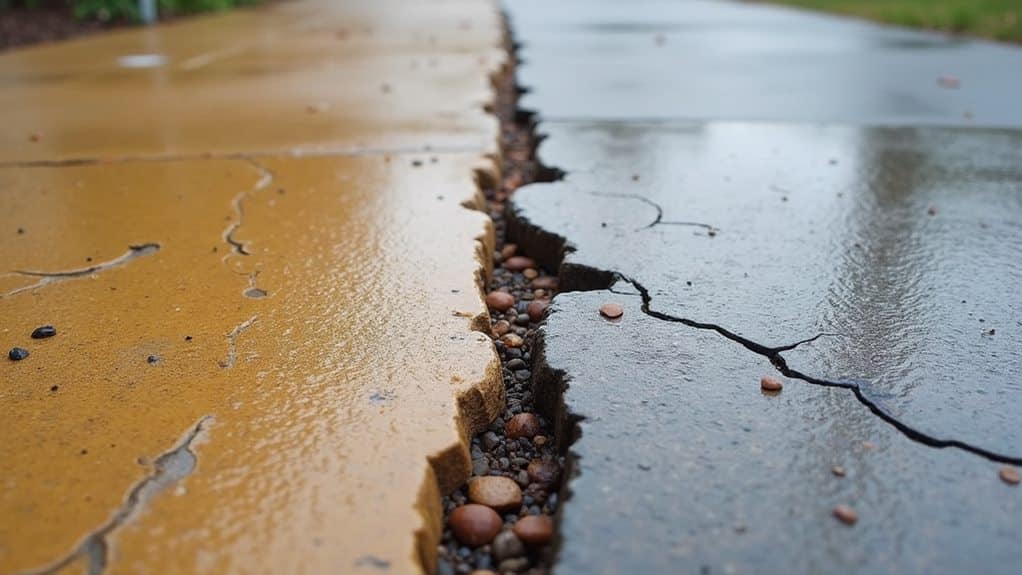
Resin driveways offer superior durability and weather resistance compared to traditional materials in three key ways.
Firstly, resin bound surfaces handle heavy traffic for 20+ years with minimal maintenance, whilst standard concrete driveways, though lasting up to 35 years, often suffer from cracks and weather damage. The unique honeycomb structure allows the surface to expand sideways, preventing common failures seen in conventional materials. At £110 per square metre for professional installation, it’s an investment that delivers excellent longevity.
Secondly, resin driveways maintain their appearance without fading in sunlight, unlike asphalt and concrete which often show wear and discolouration over time.
Finally, the permeable nature of resin surfaces means rainwater drains through effectively, preventing puddles and flooding risks – a common problem with traditional materials.
These features create a practical driveway solution that stands up to British weather whilst maintaining its structural integrity.
Maintenance Requirements Over Time
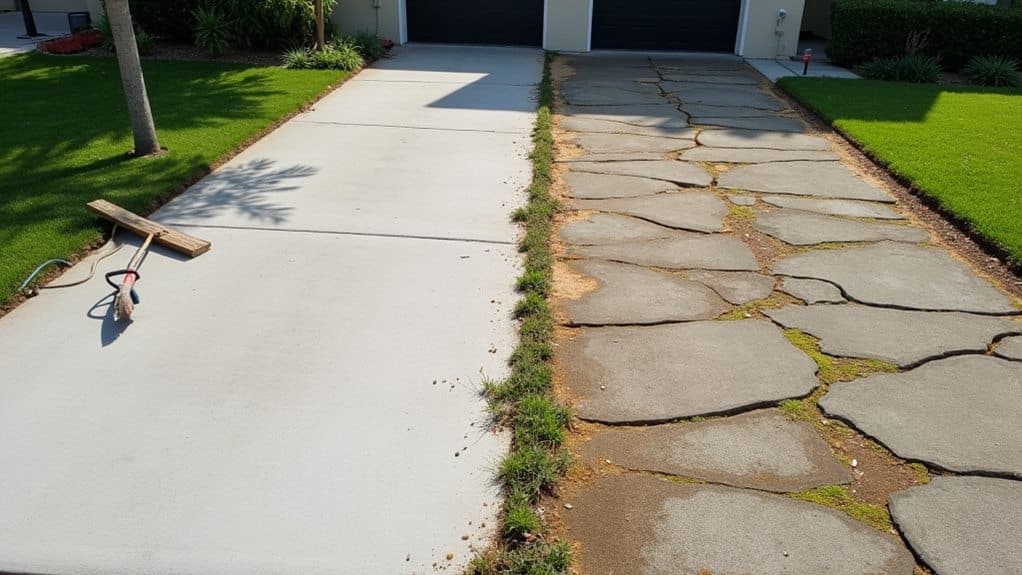
Resin driveways require far less maintenance than traditional surfaces. A simple sweep and occasional pressure wash are typically all that’s needed to keep them looking fresh.
Thanks to their robust construction, these surfaces can handle weights of up to 400 tonnes per square centimetre whilst maintaining their structural integrity, even under heavy usage. This straightforward care routine saves both time and money in the long run.
Block paving, however, demands more regular attention. The joints between blocks are prone to weed growth, making frequent weeding and treatment necessary.
You’ll also need to reseal the surface periodically to prevent water damage and keep the pavers looking their best.
When comparing long-term maintenance costs, resin bound surfaces prove more economical. Their seamless construction naturally prevents weed growth and requires minimal repairs.
While both types of driveways benefit from routine checks, block paving is more vulnerable to frost damage and weed invasion, leading to higher maintenance costs throughout its lifetime.
Environmental Impact and Drainage
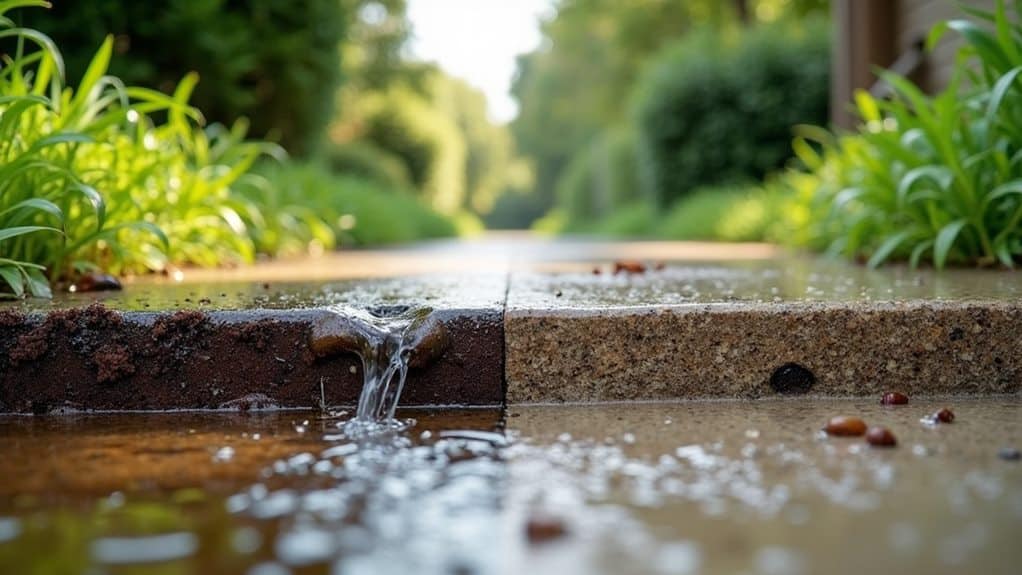
Environmental Impact and Drainage
Resin bound driveways offer a sustainable paving option that tackles modern water management issues head-on. The system’s fully permeable surface meets all Sustainable Urban Drainage Systems (SUDs) requirements for new builds whilst allowing natural water filtration into the ground.
These driveways incorporate recycled materials, including ground-up tyres and plastic waste, making them environmentally sound. The porous structure prevents standing water and flooding risks, with rainfall draining efficiently through the entire surface.
| Feature | Resin Bound | Traditional Materials |
|---|---|---|
| Water Permeability | High | Low |
| SUDs Compliance | Yes | No |
| Surface Runoff | Minimal | Considerable |
| Material Source | Recycled | Raw Materials |
| Weed Control | Natural | Chemical Required |
The permeable nature of resin bound surfaces means homeowners needn’t worry about puddles forming after heavy rain – a common problem with conventional concrete or tarmac driveways. This practical benefit, combined with its eco-credentials, makes it particularly suitable for British weather conditions.
Design Options and Aesthetics
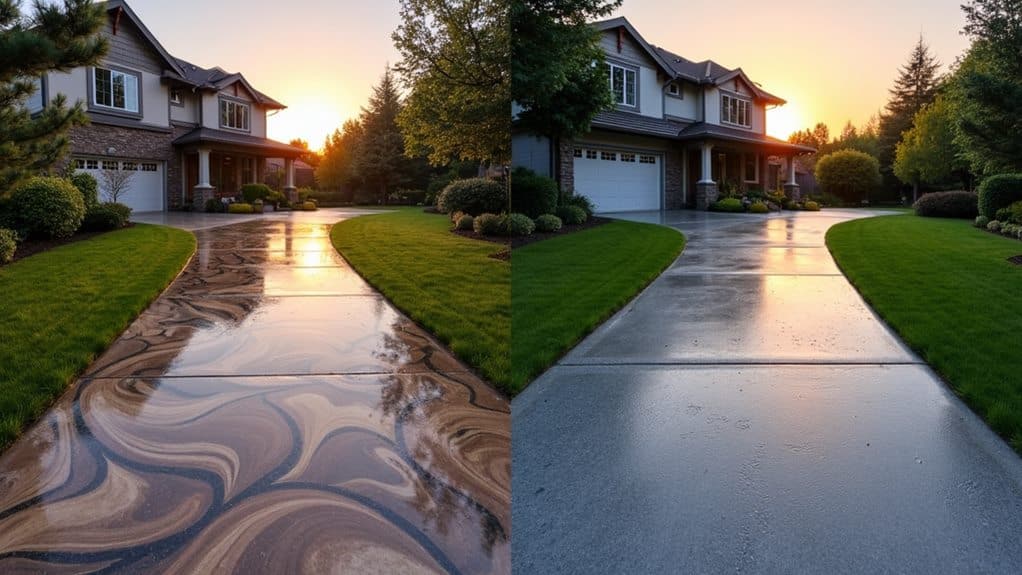
Resin bound driveways offer greater design flexibility than traditional paving, with a vast range of colour choices and the ability to add patterns, borders and personalised touches.
The DALTEX range features 48 distinct gravel blends, perfect for incorporating house numbers or company logos into your driveway design.
Unlike block paving’s limited and often-fading colour options, resin bound surfaces keep their vibrant look whilst allowing you to mix different quarried stones and recycled materials for unique finishes.
For modern homes and contemporary landscaping, resin bound surfaces deliver lasting kerb appeal and design options that outshine standard block paving.
Color Choices and Patterns
Resin driveways offer far more design flexibility than traditional materials when it comes to colours and patterns. The range of colour options with resin bound surfaces vastly outstrips standard block paving choices. Through the DALTEX collection options with 48 distinct gravel blends, you can create a truly personalised look for your driveway.
Traditional block paving typically comes in basic colours, whilst resin systems let you work with both bold shades and natural stone looks. You can add patterns and borders that match your home’s style perfectly.
The system’s versatility means you can even recreate natural textures, setting your driveway apart from standard designs.
A key benefit is the colour stability of resin surfaces. Unlike conventional paving that often fades in British weather, UV-stable resin keeps its colour for years. This means your chosen design stays fresh-looking, maintaining both kerb appeal and property value.
Modern Vs Traditional Appeal
The way we design driveways has changed markedly, with resin-bound systems now at the forefront.
British homeowners are increasingly drawn to the sleek look of resin-bound driveways over traditional block paving, thanks to their design flexibility and enduring appearance.
These surfaces also tick the sustainability box, as their permeable nature helps manage rainfall and supports natural drainage.
Key differences between modern and traditional options:
- Resin-bound surfaces come in countless colours and patterns, perfect for matching modern homes
- Block paving offers fewer design choices and often looks rather dated
- UV-stable resin keeps its colour far longer than traditional materials
- Modern resin systems use recycled materials, meeting today’s green standards
- Resin creates a smooth, uninterrupted finish versus block paving’s sectional look
Using premium aggregates with innovative binding methods, resin-bound driveways deliver the polished finish that’s become a hallmark of contemporary British landscaping, balancing practicality with modern style.
Installation Process and Timeline
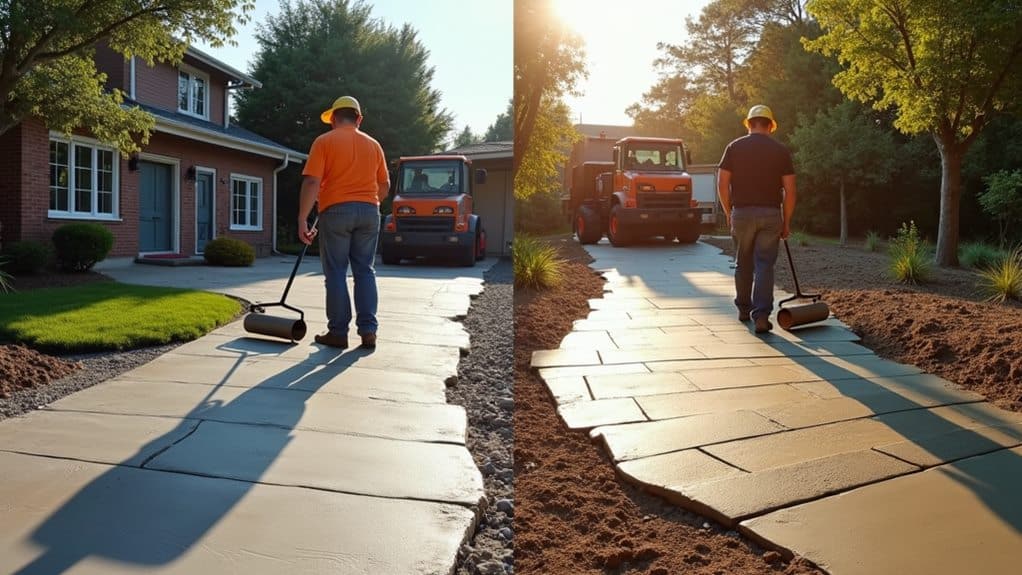
Installation timelines differ markedly between resin and traditional driveway surfaces. A resin bound driveway can be completed in just one day when laid over existing surfaces. The site must be properly cleaned and jet washed 24 hours beforehand to ensure the best results. This is much quicker than block paving, which typically takes up to a week for complete installation.
Resin installation requires precise timing and know-how. The aggregate-resin mixture must be laid without interruption to prevent drying problems and keep the surface uniform. Whilst DIY resin kits exist, it’s best to use professional installers given the technical requirements.
Block paving is equally complex, needing careful ground preparation to avoid an uneven finish and future problems.
Resin bound driveways are straightforward to install thanks to their honeycomb structure, which handles heavy vehicles and expansion well. Block paving needs extra care to prevent frost damage, making professional installation vital for lasting results.
Frequently Asked Questions
What Are the Negatives of Resin Driveways?
Higher costs hit your wallet straightaway, with installation requiring skilled specialists rather than standard builders. The complex fitting process means you’ll need proper drainage and a solid sub-base. Maintenance isn’t a one-off either – you’ll need regular cleaning to prevent moss and weeds, whilst harsh British winters can cause cracking. The colour may fade under our UV exposure, even in cloudy conditions, and the surface texture often changes over time, particularly in high-traffic areas. Most repairs require professional help, unlike simpler driveway materials.
What Is the Best Material for My Driveway?
The right driveway material depends on your key priorities: looks, upkeep, budget, longevity, environmental impact and how it handles British weather. Different materials suit different needs – for instance, gravel might work brilliantly for a country cottage but prove impractical for a busy family home in the suburbs. Consider what matters most for your situation and lifestyle.
Do Weeds Grow Through Resin Driveways?
Resin driveways offer excellent weed resistance, much like traditional Roman roads. When installed correctly, they create a solid, sealed surface that prevents weeds from taking root. The impermeable structure means minimal upkeep is needed to keep unwanted plants at bay.
How Long Will a Resin Driveway Last?
A properly installed and maintained resin driveway typically lasts upwards of 20 years. Much like a quality tarmac surface, its durability comes from professional installation and top-grade materials. UV-stable properties ensure the surface won’t fade or deteriorate in British weather conditions, making it a sound long-term investment for your property.
Conclusion
Choosing between resin and traditional driveway materials depends on your priorities. Resin comes with higher initial costs but offers exceptional durability and modern appeal. If you’re looking for a long-lasting solution that handles British weather brilliantly and prevents those bothersome puddles we’re all too familiar with, resin is worth considering. Traditional materials like tarmac or concrete remain perfectly suitable choices, particularly if you’re working with a tighter budget and favour tried-and-tested solutions.
